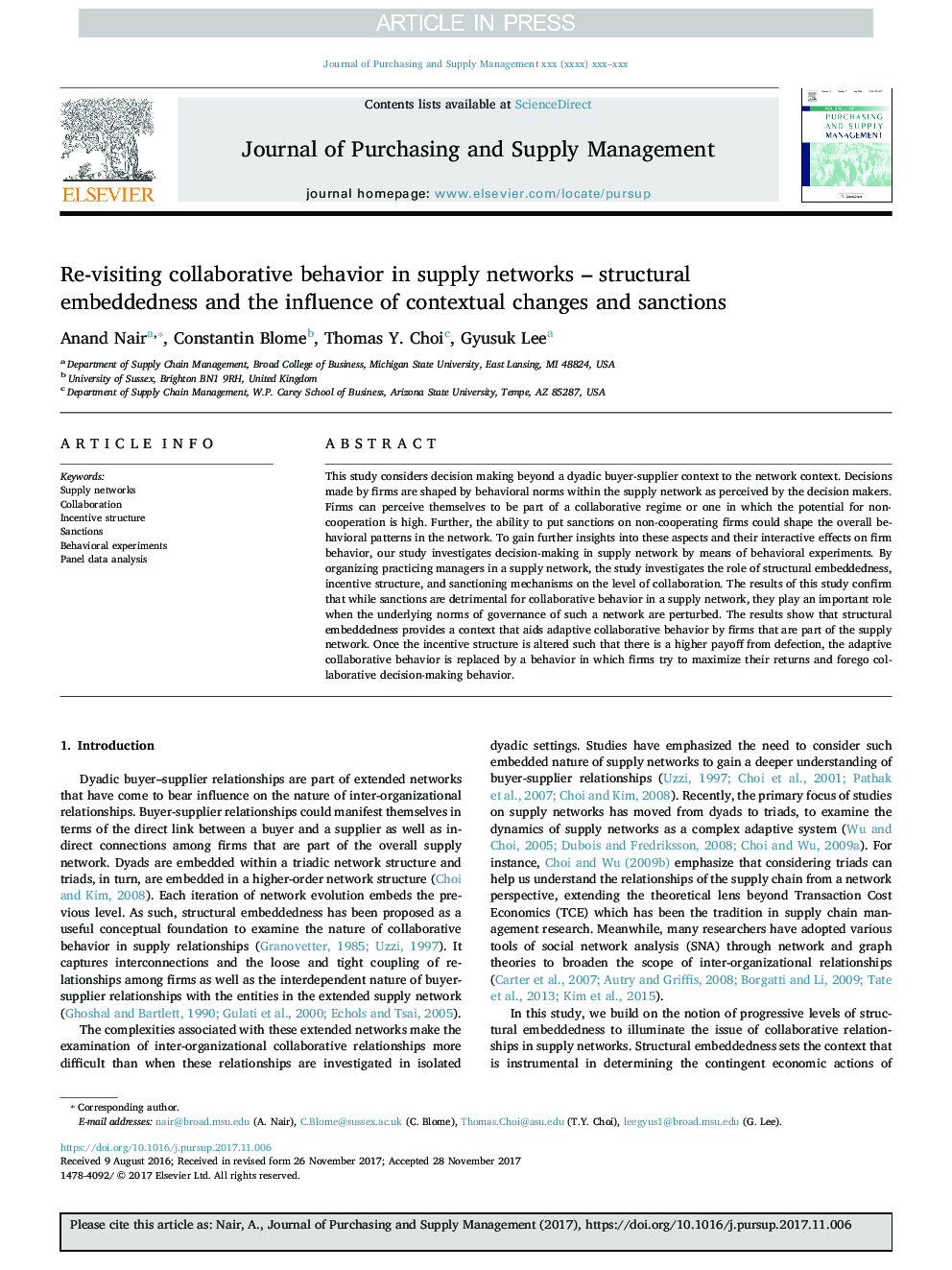| کد مقاله | کد نشریه | سال انتشار | مقاله انگلیسی | نسخه تمام متن |
|---|---|---|---|---|
| 7426669 | 1482890 | 2018 | 16 صفحه PDF | دانلود رایگان |
عنوان انگلیسی مقاله ISI
Re-visiting collaborative behavior in supply networks - structural embeddedness and the influence of contextual changes and sanctions
ترجمه فارسی عنوان
بازخوانی رفتار مشارکتی در شبکه های عرضه - تعریف ساختاری و تاثیر تغییرات و تحریم های متنی
دانلود مقاله + سفارش ترجمه
دانلود مقاله ISI انگلیسی
رایگان برای ایرانیان
کلمات کلیدی
شبکه های عرضه همکاری، ساختار انگیزشی، تحریم ها، آزمایش های رفتاری، تجزیه و تحلیل داده های پنل،
ترجمه چکیده
این مطالعه تصمیم گیری را فراتر از زمینه خریدار و تامین کننده دیودیک به زمینه شبکه می دهد. تصمیم گیری های شرکت ها توسط هنجارهای رفتاری درون شبکه عرضه شکل گرفته است که توسط تصمیم گیرندگان درک شده است. شرکت ها می توانند خود را بخشی از یک رژیم مشارکتی یا یکی که در آن پتانسیل عدم همکاری بالا باشد. علاوه بر این، توانایی اعمال تحریم ها بر شرکت های غیرمستقیم می تواند الگوهای رفتاری کلی شبکه را شکل دهد. برای به دست آوردن بینش بیشتر در مورد این جنبه ها و اثرات تعاملی آنها بر رفتار شرکت، تصمیم گیری ما در مورد تصمیم گیری در شبکه عرضه با استفاده از آزمایش های رفتاری انجام شده است. با سازماندهی مدیران تمرین در یک شبکه عرضه، مطالعه در مورد نقش تعبدی ساختاری، ساختار انگیزشی و مکانیزم تحریم در سطح همکاری بررسی می شود. نتایج این مطالعه تایید می کند که در حالی که تحریم ها برای رفتار مشترک در یک شبکه عرضه مضر هستند، آنها نقش مهمی را ایفا می کنند، زمانی که هنجارهای حاکم بر چنین شبکه ای متضرر می شوند. نتایج نشان می دهد که تعبیه ساختاری زمینه ای را فراهم می کند که رفتار سازمانی سازگار را توسط شرکت هایی که بخشی از شبکه عرضه هستند، کمک می کند. هنگامی که ساختار انگیزه تغییر می کند به طوری که بازده بالاتری از تخریب وجود دارد، رفتار مشترک سازگار با رفتارهایی که شرکت ها سعی می کنند به حداکثر رساندن بازدهی خود و جلوگیری از رفتار تصمیم گیری مشترک بپردازند جایگزین می شود.
موضوعات مرتبط
علوم انسانی و اجتماعی
مدیریت، کسب و کار و حسابداری
کسب و کار و مدیریت بین المللی
چکیده انگلیسی
This study considers decision making beyond a dyadic buyer-supplier context to the network context. Decisions made by firms are shaped by behavioral norms within the supply network as perceived by the decision makers. Firms can perceive themselves to be part of a collaborative regime or one in which the potential for non-cooperation is high. Further, the ability to put sanctions on non-cooperating firms could shape the overall behavioral patterns in the network. To gain further insights into these aspects and their interactive effects on firm behavior, our study investigates decision-making in supply network by means of behavioral experiments. By organizing practicing managers in a supply network, the study investigates the role of structural embeddedness, incentive structure, and sanctioning mechanisms on the level of collaboration. The results of this study confirm that while sanctions are detrimental for collaborative behavior in a supply network, they play an important role when the underlying norms of governance of such a network are perturbed. The results show that structural embeddedness provides a context that aids adaptive collaborative behavior by firms that are part of the supply network. Once the incentive structure is altered such that there is a higher payoff from defection, the adaptive collaborative behavior is replaced by a behavior in which firms try to maximize their returns and forego collaborative decision-making behavior.
ناشر
Database: Elsevier - ScienceDirect (ساینس دایرکت)
Journal: Journal of Purchasing and Supply Management - Volume 24, Issue 2, March 2018, Pages 135-150
Journal: Journal of Purchasing and Supply Management - Volume 24, Issue 2, March 2018, Pages 135-150
نویسندگان
Anand Nair, Constantin Blome, Thomas Y. Choi, Gyusuk Lee,
